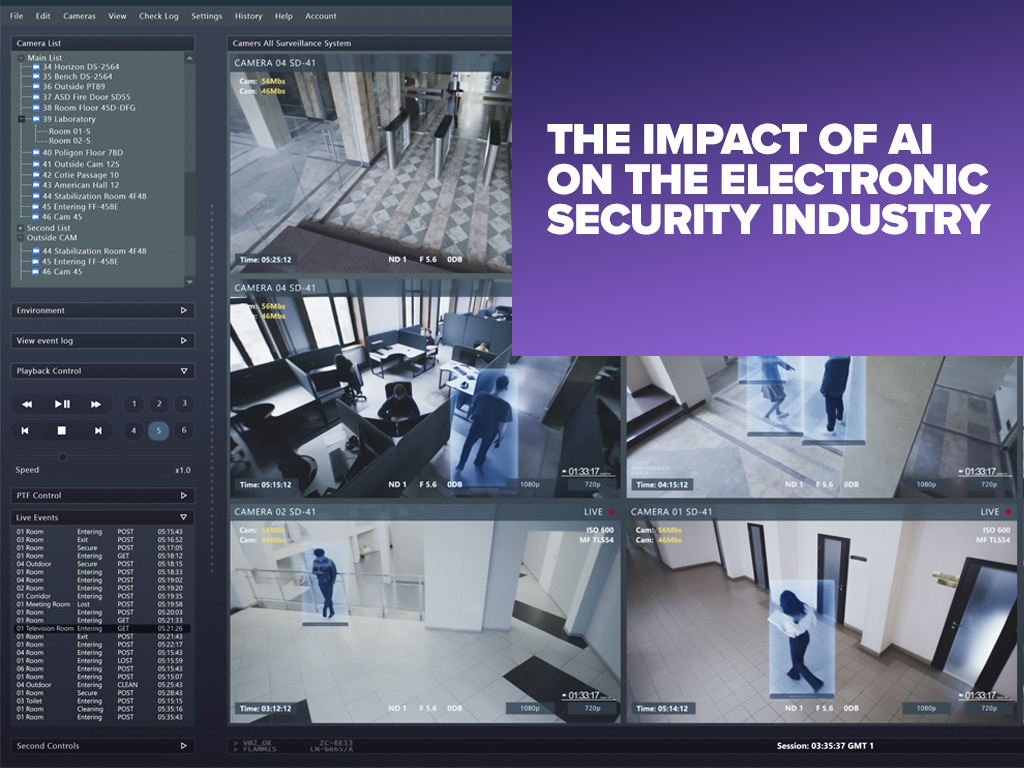The Impact of AI on The Electronic Security Industry

By Kevin Stone, ESA Chairman
Artificial Intelligence (AI) is rapidly transforming many industries, including our own electronic security industry. From enhancing traditional alarm systems to revolutionizing how CCTV footage is monitored and analyzed, AI is helping businesses and homeowners alike to secure their properties more effectively. The integration of AI technologies is improving security performance; it is reshaping expectations, roles, and the overall functionality of security systems.
Alarm Systems
Traditional alarm systems have simple binary responses: a door is open when it shouldn’t be, a motion sensor is tripped, or a window is broken. These systems then sound an alarm or alert the property owner or monitoring center. However, these systems often result in false alarms, caused by pets, falling objects, or even poor weather, leading to unnecessary disruptions and, in some cases, fines from local authorities.
As we’re all coming to see, AI is addressing this issue by enabling alarm systems to learn and adapt to their environments. Machine learning algorithms can distinguish between normal and suspicious activity by analyzing patterns over time. For instance, AI enhanced motion sensors can differentiate between a dog walking through the living room and a person. AI also supports multi-sensor data fusion, meaning it can combine input from various devices such as cameras, door sensors, and environmental sensors to make smarter decisions.
Voice recognition, facial recognition, and behavioral pattern analysis are also being incorporated into access control and intrusion detection systems. This allows alarm systems to verify users through biometrics or predict unusual behavior that may indicate a potential breach, significantly improving the accuracy and reliability of these systems.
AI Driven Video Surveillance Systems
One of the most significant AI advancements in the security industry is in the realm of video surveillance. Traditionally, video systems have been passive, recording hours of footage that must be manually reviewed to identify security incidents. With the addition of AI, surveillance systems have become proactive and intelligent.
AI-powered video analytics allow video surveillance systems to automatically detect suspicious activity in real-time. These systems can recognize objects, track movement, and even analyze behavior to detect potential threats. For example, a camera can alert security personnel if someone is loitering near an entrance for an extended period, or if a vehicle is parked in a restricted area.
Facial recognition software can identify known individuals or flag unfamiliar faces in secure zones, adding another layer of security. License plate recognition is increasingly used for vehicle access control and surveillance on commercial and residential properties. Moreover, AI can help filter out irrelevant footage and highlight only segments that require attention, greatly reducing the workload for security teams.
AI is also enhancing remote monitoring capabilities. Cloud-based AI platforms allow footage to be analyzed off site in real time, making surveillance more accessible and efficient for businesses with multiple locations or limited on-site personnel.
Smarter Monitoring Centers with AI
AI is also revolutionizing central monitoring stations, which serve as the nerve centers of alarm response. Traditionally, human operators must sift through large volumes of alerts, many of which turn out to be false alarms. This manual process is labor intensive and prone to delays, especially during peak times.
AI-powered platforms can now pre-analyze incoming alarm data before it ever reaches a human operator. By using historical data, machine learning algorithms can filter out false alarms, detect patterns that indicate real threats, and prioritize alerts based on risk level. For example, an AI system might learn that motion alerts triggered every day at 8 a.m. in a certain location are routine and harmless, while unexpected activity at 2 a.m. is more likely to require a response.
AI also enables automated voice assistants and virtual agents to handle initial communications with property owners, verify activity, or ask follow-up questions before escalating to a live operator. This allows monitoring staff to focus on genuine emergencies and significantly improves response times. As a result, monitoring centers are faster and more effective. Reduced false alarms mean fewer unnecessary dispatches, saving time and resources for both the security provider and emergency services.
Looking Ahead
AI is poised to continue transforming the electronic security industry by making systems more intelligent, responsive, and accurate. Alarm systems that once functioned on simple triggers are now capable of learning and evolving. Video surveillance systems, previously dependent on human observation, are now leveraging AI to detect and prevent incidents in real time. Ultimately, the fusion of AI and electronic security is setting a new standard for safety and operational efficiency in both residential and commercial settings.




